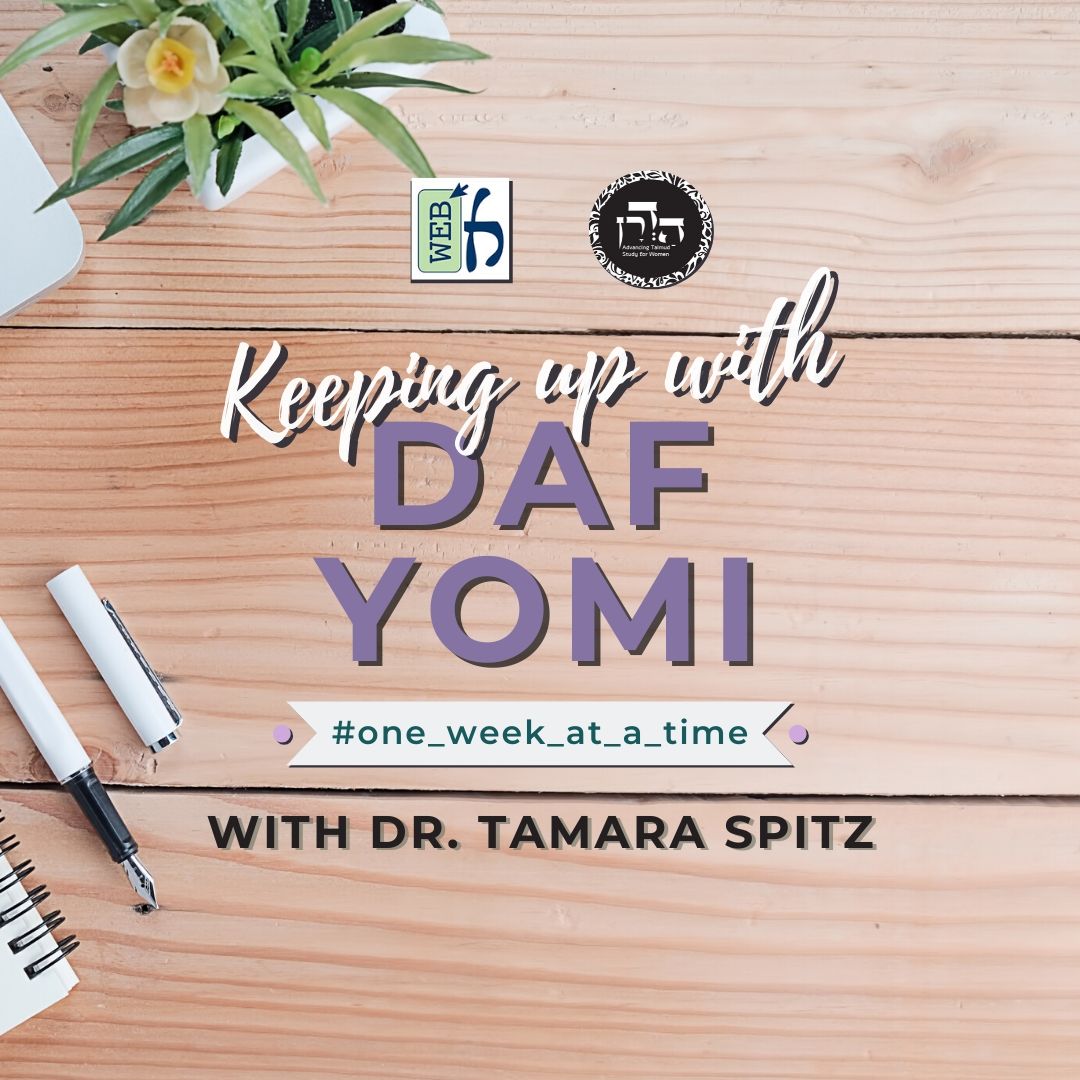Nedarim 29
Share this shiur:
This week’s learning is sponsored for the merit and safety of Haymanut (Emuna) Kasau, who was 9 years old when she disappeared from her home in Tzfat two years ago, on the 16th of Adar, 5784 (February 25, 2024), and whose whereabouts remain unknown.
This week’s learning is dedicated of the safety of our nation, the soldiers and citizens of Israel, and for the liberation of the Iranian people. May we soon see the realization of “ליהודים היתה אורה ושמחה וששון ויקר”.
This week’s learning is sponsored for the merit and safety of Haymanut (Emuna) Kasau, who was 9 years old when she disappeared from her home in Tzfat two years ago, on the 16th of Adar, 5784 (February 25, 2024), and whose whereabouts remain unknown.
Want to dedicate learning? Get started here:


Summary
Today’s daily daf tools:
This week’s learning is sponsored for the merit and safety of Haymanut (Emuna) Kasau, who was 9 years old when she disappeared from her home in Tzfat two years ago, on the 16th of Adar, 5784 (February 25, 2024), and whose whereabouts remain unknown.
This week’s learning is dedicated of the safety of our nation, the soldiers and citizens of Israel, and for the liberation of the Iranian people. May we soon see the realization of “ליהודים היתה אורה ושמחה וששון ויקר”.
This week’s learning is sponsored for the merit and safety of Haymanut (Emuna) Kasau, who was 9 years old when she disappeared from her home in Tzfat two years ago, on the 16th of Adar, 5784 (February 25, 2024), and whose whereabouts remain unknown.
Today’s daily daf tools:
Delve Deeper
Broaden your understanding of the topics on this daf with classes and podcasts from top women Talmud scholars.
New to Talmud?
Check out our resources designed to help you navigate a page of Talmud – and study at the pace, level and style that fits you.
The Hadran Women’s Tapestry
Meet the diverse women learning Gemara at Hadran and hear their stories.
Nedarim 29
אֲמַר לֵיהּ רַב הַמְנוּנָא: קְדוּשָּׁה שֶׁבָּהֶן לְהֵיכָן הָלְכָה? וּמָה אִילּוּ אָמַר לְאִשָּׁה ״הַיּוֹם אַתְּ אִשְׁתִּי וּלְמָחָר אִי אַתְּ אִשְׁתִּי״, מִי נָפְקָא בְּלָא גֵּט?!
Rav Hamnuna said to Ulla: Where did their sanctity go? How can the consecrated saplings become non-sacred without being redeemed? And what would happen if one said to a woman while performing betrothal: Today you are my wife and tomorrow you are not my wife? Would she exit the marriage the next day without a bill of divorce? Likewise, in the mishna, once one consecrated the saplings, how is their sanctity withdrawn without redemption?
אֲמַר לֵיהּ רָבָא: מִי קָא מְדַמֵּית קְדוּשַּׁת דָּמִים לִקְדוּשַּׁת הַגּוּף? קְדוּשַּׁת דָּמִים פָּקְעָה בִּכְדֵי, קְדוּשַּׁת הַגּוּף לָא פָּקְעָה בִּכְדִי.
Rava said to him: How do you compare sanctity inherent in its value to inherent sanctity? Sanctity inherent in its value departs with nothing being done, since it is conditional. When the condition is fulfilled and the saplings are cut, the sanctity is removed. However, inherent sanctity, which relates to an entity that itself is consecrated, e.g., a betrothed woman, does not depart with nothing being done. An action must be performed in order to remove it.
אֲמַר לֵיהּ אַבָּיֵי: קְדוּשַּׁת הַגּוּף לָא פָּקְעָה בִּכְדִי? וְהָתַנְיָא: ״שׁוֹר זֶה עוֹלָה כׇּל שְׁלֹשִׁים יוֹם, וּלְאַחַר שְׁלֹשִׁים יוֹם שְׁלָמִים״ — כׇּל שְׁלֹשִׁים יוֹם עוֹלָה, לְאַחַר שְׁלֹשִׁים יוֹם שְׁלָמִים. אַמַּאי? קְדוּשַּׁת הַגּוּף נִינְהוּ, וּפָקְעָה בִּכְדִי!
Abaye said to him: And does inherent sanctity not depart with nothing being done? But isn’t it taught in a baraita that if one said: This ox is a burnt-offering for all of thirty days and after thirty days it is a peace-offering, for all of thirty days it is a burnt-offering and after thirty days it is a peace-offering. One can ask: Why is this so? These offerings are examples of inherent sanctity, and it departs with nothing being done. After thirty days, it is transformed into a peace-offering without any action being taken.
הָכָא בְּמַאי עָסְקִינַן, דְּאָמַר לִדְמֵי.
The Gemara answers: With what are we dealing here? It is a case where one did not consecrate the animal as a burnt-offering or peace-offering but rather he said that he was consecrating it for its monetary value, with which to purchase a burnt-offering or peace-offering. Therefore, there was no inherent sanctity.
אִי הָכִי, אֵימָא סֵיפָא: ״לְאַחַר שְׁלֹשִׁים יוֹם עוֹלָה, וּמֵעַכְשָׁיו שְׁלָמִים״. אִי אָמְרַתְּ בִּשְׁלָמָא חֲדָא בִּקְדוּשַּׁת הַגּוּף, וַחֲדָא בִּקְדוּשַּׁת דָּמִים —
The Gemara asks: If so, say the latter clause: If he said that after thirty days it should be a burnt-offering, and from now until thirty days it should be a peace-offering, his words are binding. Granted, if you say that one clause is referring to inherent sanctity and one clause is referring to sanctity inherent in its value,
הַיְינוּ דְּאִיצְטְרִיךְ לֵיהּ לְתַנָּא לְמִיתְנֵא תַּרְתֵּי. דְּסָלְקָא דַּעְתָּךְ אָמֵינָא: קְדוּשַּׁת הַגּוּף לָא פָּקְעָה בִּכְדִי, קְדוּשַּׁת דָּמִים פָּקְעָה בִּכְדִי, אַמְּטוּ לְהָכִי תְּנָא תַּרְתֵּי.
then this is the reason that it was necessary for the tanna to teach two clauses: In order to emphasize that this halakha applies in both cases, as it might enter your mind to say: Inherent sanctity does not lapse on its own, but sanctity inherent in its value departs with nothing being done. Because of this, the tanna taught two clauses, to demonstrate that there is no difference between them: Both depart with nothing being done.
אֶלָּא אִי אָמְרַתְּ אִידֵּי וְאִידֵּי קְדוּשַּׁת דָּמִים, לְמָה לִי לְמִיתְנֵא תַּרְתֵּי? הַשְׁתָּא יֵשׁ לוֹמַר: מִקְּדוּשָּׁה חֲמוּרָה לִקְדוּשָּׁה קַלָּה פָּקְעָה, מִקְּדוּשָּׁה קַלָּה לִקְדוּשָּׁה חֲמוּרָה צְרִיכָא לְמֵימַר?!
But if you say that this clause and that clause refer to sanctity inherent in its value, why do I need to teach two clauses? Now, it can be said that if from the stringent sanctity of the burnt-offering to the less stringent sanctity of a peace-offering, the stringent sanctity departs and the animal becomes like a peace-offering, then from the less stringent sanctity of the peace-offering to the more stringent sanctity of the burnt-offering, need this be said?
לֵימָא תֶּיהְוֵי תְּיוּבְתָּא דְּבַר פְּדָא, דְּאָמַר: לָא פָּקְעָה קְדוּשָּׁה בִּכְדִי?
The Gemara proposes: Let us say that this baraita should be a conclusive refutation of bar Padda, who said: Sanctity does not depart with nothing being done and the trees require redemption, while the baraita demonstrates that even inherent sanctity lapses on its own?
אָמַר רַב פָּפָּא: אָמַר לָךְ בַּר פְּדָא, הָכִי קָאָמַר: אִם לֹא אָמַר ״מֵעַכְשָׁיו שְׁלָמִים״ — לְאַחַר שְׁלֹשִׁים יוֹם עוֹלָה הָוֵי.
Rav Pappa said: Bar Padda could have said to you: This is what the baraita is saying: If one says: This ox, after thirty days, is a burnt-offering, then if he does not say: From now it is a peace-offering, then after thirty days it is a burnt-offering. But when he adds: From now it is a peace-offering, the sanctity of a peace-offering takes effect upon it and does not depart with nothing being done.
מִידֵּי דְּהָוֵה הָאוֹמֵר לְאִשָּׁה: ״הִתְקַדְּשִׁי לִי לְאַחַר שְׁלֹשִׁים יוֹם״, דִּמְקוּדֶּשֶׁת וְאַף עַל פִּי שֶׁנִּתְעַכְּלוּ הַמָּעוֹת.
This is just as it is in the case of a man who says to a woman: Be betrothed to me after thirty days with this money that I give you, that she is betrothed after thirty days. And this is so, although the money was squandered away in the meantime and does not exist at the end of thirty days, when the betrothal takes effect. Here as well, the sanctity of a burnt-offering takes effect after thirty days.
פְּשִׁיטָא? לָא צְרִיכָא דַּהֲדַר בֵּיהּ.
The Gemara asks: If this is what happened, then it is obvious that it is so. Why, then, does this halakha need to be taught? The Gemara answers: No, it is necessary in a case where he retracted within these thirty days and did not want the animal to be consecrated at all. Although the sanctity did not actually take effect yet, he may not retract.
הָנִיחָא לְמַאן דְּאָמַר אֵינָהּ חוֹזֶרֶת. אֶלָּא לְמַאן דְּאָמַר חוֹזֶרֶת, מַאי אִיכָּא לְמֵימַר!
The Gemara asks: This works out well according to the one who said that a woman who is betrothed on the condition that the betrothal takes effect after thirty days may not retract even if she changed her mind within these thirty days, and the betrothal still takes effect after thirty days. But according to the one who says that she may retract, what can be said? Why should the halakha of consecration be any different than for betrothal?
אֲפִילּוּ לְמַאן דְּאָמַר הָתָם חוֹזֶרֶת, הָכָא שָׁאנֵי — דַּאֲמִירָתוֹ לְגָבוֹהַּ כִּמְסִירָתוֹ לְהֶדְיוֹט.
The Gemara answers: Even according to the one who says that there, in the case of betrothal, the woman may retract within thirty days, here, in the case of the burnt-offering, it is different because the legal status of one’s declaration to God is equal to that of his transfer to a common person [hedyot], where the acquisition is consummated at the time of transfer. Since God is not associated with a particular location, a verbal statement is sufficient to establish sanctity immediately. But in the case of the betrothal of a woman, it can be argued that the betrothal takes effect only at the end of thirty days.
יְתֵיב רַבִּי אָבִין וְרַב יִצְחָק בְּרַבִּי קַמֵּיהּ דְּרַבִּי יִרְמְיָה, וְקָא מְנַמְנֵם רַבִּי יִרְמְיָה, יָתְבִי וְקָאָמְרִי: לְבַר פְּדָא דְּאָמַר פְּדָאָן חוֹזְרוֹת וְקוֹדְשׁוֹת,
The Gemara relates: Rabbi Avin and Rav Yitzḥak, son of Rabbi, sat before Rabbi Yirmeya, and Rabbi Yirmeya was dozing [menamnem]. While he was dozing, they sat and said: According to bar Padda, who said that if he redeems them they become consecrated again,























